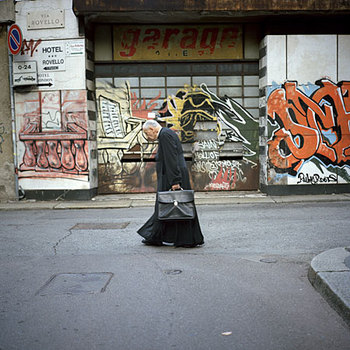 "A priest passes an abandoned garage covered with graffiti in Milan. Italy’s malaise, an economic, political, and social funk, was summed up in a recent poll: Italians report themselves to be the least happy people in Western Europe." Source of caption and photo: online verison of the NYT article quoted and cited below.
"A priest passes an abandoned garage covered with graffiti in Milan. Italy’s malaise, an economic, political, and social funk, was summed up in a recent poll: Italians report themselves to be the least happy people in Western Europe." Source of caption and photo: online verison of the NYT article quoted and cited below.
(p. A1) ROME — All the world loves Italy because it is old but still glamorous. Because it eats and drinks well but is rarely fat or drunk. Because it is the place in a hyper-regulated Europe where people still debate with perfect intelligence what, really, the red in a stoplight might mean.
But these days, for all the outside adoration and all of its innate strengths, Italy seems not to love itself. The word here is “malessere,” or “malaise”; it implies a collective funk — economic, political and social — summed up in a recent poll: Italians, despite their claim to have mastered the art of living, say they are the least happy people in Western Europe.
“It’s a country that has lost a little of its will for the future,” said Walter Veltroni, the mayor of Rome and a possible future center-left prime minister. “There is more fear than hope.”
. . .
. . . In 1987, Italy celebrated its economic parity with Britain. Now Spain, which joined the European Union only a year earlier, may soon overtake it, and Italy has fallen behind Britain.
Italy’s low-tech way of life may enthrall tourists, but Internet use and commerce here are among the lowest in Europe, as are wages, foreign investment and growth. Pensions, public debt and the cost of government are among the highest.
. . .
(p. A18) . . . entrepreneurs complain that they are alone. Politicians offered little help making Italy competitive, and this remains a major impediment to making their gains grow. Businesses want less bureaucracy, more flexible labor laws and large investments in infrastructure to make moving goods around easier.
. . .
. . . Many worry . . . that Italy may share the same fate as the Republic of Venice, based in what many say is the most beautiful of cities, but whose domination of trade with the Near East died with no culminating event. Napoleon’s conquest in 1797 only made it official.
Now it is essentially an exquisite corpse, trampled over by millions of tourists. If Italy does not shed its comforts for change, many say, a similar fate awaits it: blocked by past greatness, with aging tourists the questionable source of life, the Florida of Europe.
. . .
. . . “We have reached a point where hoping for some kind of white knight coming in saying, ‘We’ll sort you out,’ is over.”
“We Italians have our destiny in our hands more than ever before,” he said.
For the full story, see:
(Note: ellipses added.)

In his December 13th article, “In a Funk, Italy Sings an Aria of Disappointment” Ian Fisher quotes Rome’s mayor Walter Veltroni as saying that Italy is “…a country that has lost a little of its will for the future.”
I believe the mayor could have expressed his sentiments in more precise terms.
I do not believe that Italy has lost its will for the future, nor do I believe that Italy has lost its will at all. However, I do believe that Italy may have temporarily misplaced it. I suspect that, like a prize fighter, Italy has taken a few more blows to the head in the past few years than would be considered “within comfortable limits” and is feeling the effects of fatigue. I also believe that this feeling will not endure.
Italy has had a long tradition of being the “come-back kid.” Over the centuries the peninsula and surrounding islands have been conquered, liberated, conquered again and united. Since the early days of the Roman Empire, Italy has seen economic depressions and great losses, but these adversities–both periodic and finite–have resulted in a country that is both proud and strong, rich in history and culture.
I also applaud and at the same time, chastise Ian Fisher for the preciseness of his article’s title. There is a reason why Italy sings both arias of joy and despair: because it can. Because it created the medium in the first place. Ian Fisher chose his metaphor with precision but perhaps his intent might be aided with a somewhat more substantive definition of what an aria really is:
An aria is but a short song sung by a single voice. It is a small part of a much larger and greater operatic work that only reflects the individual character’s emotional state. It does not, however, represent the entire opera, nor does it necessarily portray the emotions of “all” of the characters in the opera itself.
For the opera to work, other voices need to sing, and other songs need to be sung.
I cannot say who the “individual” was who sang this particular aria, but I do not believe it is at all accurate to call the character “Italy.” Italy sings with more than just one voice, so it could not have possibly sung the aria that Ian Fisher describes. This aria, then, more accurately represents a single individual or entity, and the opera in which it is contained may tell an altogether different story.
I doubt that the entire opera has even been written yet.
I would surmise, therefore, that this oeuvre is far from over.
Michael David Todaro